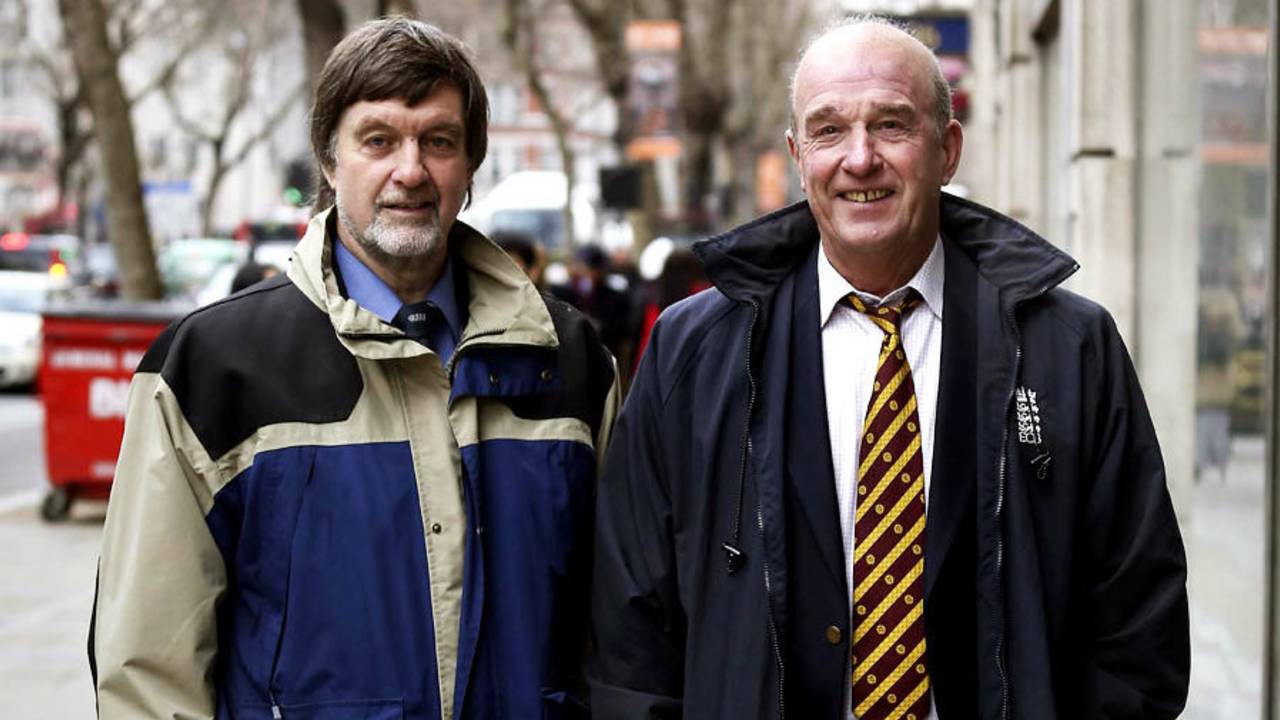The Central London Employment Tribunal is accustomed to dealing with distraught individuals whose careers have been terminated in their relative infancy. As senior judge Joanna Wade mentioned this week, presiding over the futures of two cricket umpires in their mid-60s, with glowing testimonies as to their unimpaired abilities, is an altogether different matter. Hence the outcome of the age discrimination and unfair dismissal case brought by
Peter Willey and
George Sharp against the ECB is a hard one for even experienced lawyers to call.
The ECB's final review of Willey, after 22 years as an umpire in both international and county cricket, reads: "Another very impressive year from a very senior umpire whose influence on colleagues cannot be over-estimated. As ever, your match control, overall awareness and presence, and a tacit concern always to serve the game's best interests are sterling qualities for which we are grateful." No reason, you would think, for any employer to wish to dispense with his services. Nor those of Sharp, who has 23 years' experience to his name following a long career as a player.
There is no doubting, too, the willingness of both men to assist younger colleagues. And they have an all-important reputation for being able to deal with any trouble on the pitch. Tales of arm-wrestling between Willey and Ian Botham, however fanciful, have long worked in Willey's favour. Both he and Sharp, however, have reached the statutory retirement age of 65; or at least Willey has and Sharp will have done before the start of the new season. The ECB's take is that they have to make way for younger, newly retired cricketers who wish to stay in the game by ascending from the reserve umpiring list to the first-class panel.
Under changed employment legislation, introduced in 2011, employers have to come up with a justification as to why individuals must retire at 65. In addition to their competence, no one is questioning the fitness of either Willey or Sharp. An optometrist examines the eyesight of every umpire each year and has found no fault with either. There is little, if any, doubting, that they would continue to enhance the game.
One of the prime arguments put forward by Chris Kelly, the ECB's umpires manager, for adhering to a rigid retirement policy, was that he would not wish to have to terminate their careers if and when they began to lose their faculties. John Holder, the retired umpire called in support of his two former colleagues, said they would still be capable of standing in the middle all day, judgements unimpaired, when they were 80. Kelly believes men of their standing should quit when at the top of their game, in a dignified way.
Kelly said that, in not allowing Willey and Sharp to carry on, he had their standing in the game in mind. "I did not want their dignity to be threatened" he said, although he admitted there was no evidence of physical or eyesight deterioration to support the theory. He emphasised the importance of health and safety issues through knowing of three umpires who have struck by balls driven by batsmen.
"The umpires all tell me the game is constantly speeding up and they feel more vulnerable when the ball is hit in their direction," Kelly said. "The physical and mental demands on them are greater. Would it be sensible to have umpires still standing at 75 or 80? I suspect not."
Another aspect emphasised was that Willey and Sharp do not want to leave the game they love. Evidently neither wants to sit around at home. Willey, who made his first-class debut at the age of 16 and has been in the game for 49 uninterrupted years, said in his witness statement that for personal reasons he had not been able actively to seek employment since his enforced retirement. Willey said that his family were concerned he had been suffering from depression over his uncertain future and were worried what would happen to him psychologically if he remained unemployed come the start of the new season in April.
"I have been very distressed that I have not been allowed to continue in my job," he said. "I felt that after 49 years in the game, 22 as an umpire, still respected for my umpiring and as a person around the first-class circuit, all my knowledge was being cast aside because of my age, not my ability."
Sharp, who also gave evidence, said he had been unable to find employment since the end of last season and was undertaking a course in cricket scoring to try and remain in the game. "My loyalty and dedication have been totally disregarded by the ECB when considering my desire to continue. To this day I cannot understand the policy," he said in his statement.
The plain talking of both men was in marked contrast to the long-winded approach of their legal teams, who were not cricket experts and went off, at times, down cul-de-sacs of third and reserve umpires. Asked by Ms Wade about how he would feel if he were to receive a tap on the shoulder by the ECB to stand down, should he continue umpiring, Sharp responded: "I've had the sack before. I got on with life." He told the tribunal he would know when his standards were dropping. "I was offered a two-year contract extension as a player by Northamptonshire when I was 35, but I knew it was time to give up."
A tribunal judgement is expected before the end of February.
